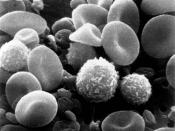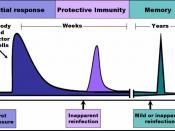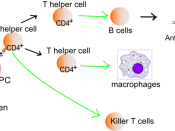The function of the immune system is to defend the body against foreign invaders that may cause disease. The immune system is made up of cells, tissues, organs, and body systems that fight bacteria, viruses, harmful chemicals, and cancer cells. The skin functions as a defense against disease because of the millions of helpful bacteria that live on your skin. This is your first line of defense by killing many harmful types of bacteria. When there is a break in the skin, your body is not defenseless. Several other body systems maintain health. First, the circulatory system contains white blood cells that engulf and digest foreign organisms and chemicals. If the white cells cannot destroy the bacteria, a fever may develop. A fever can help to fight the pathogen. Second, the respiratory system contains cilia and mucus to trap pathogens. In the digestive system, enzymes in the stomach, pancreas, and liver destroy pathogens.
T-cells are produced in the bone marrow and thymus gland and interact with the body's own cells, regulating the immune response and acting against foreign cells that are not susceptible to antibodies.
A nonspecific response protects the body from all foreign substances. The specific response recognizes and acts against particular foreign invaders.
A vaccination is a means of producing immunity against pathogens such as viruses and bacteria by the introduction of live, killed, or altered antigens that stimulate the body to produce antibodies against more dangerous forms. A person who is overly reactive to an antigen is said to be allergic whenever an allergic reaction occurs. Then there is tissue damage.
The antigens that induce an allergic reaction are called allergens. Examples include certain foods, chemicals, dust, grass pollen, food pollen, molds, and some antibiotics. When you come in contact with one of these allergens, your immune...



Thanks. this essay helped me.
thanks for the essay on the immune system. it helped me on an assignment for school. i encourage more people to submit essays like this one to help more guys like me.
1 out of 1 people found this comment useful.